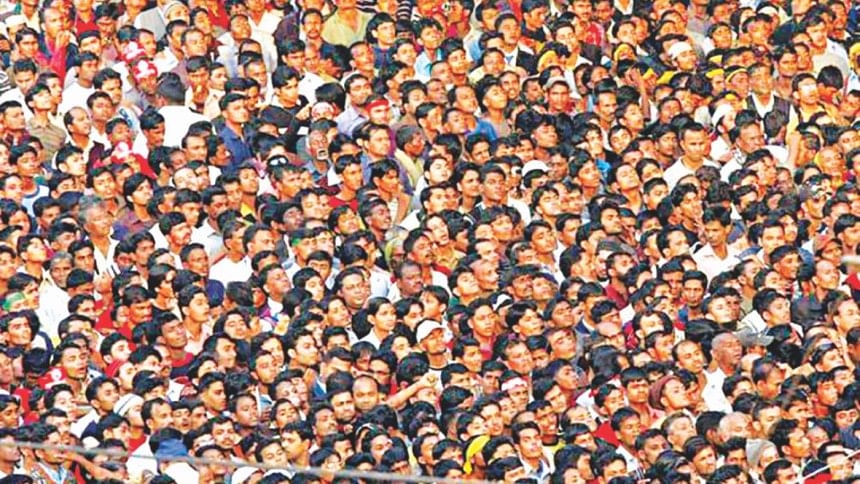Youth potential stifled by adults

The World in 2050, a PricewaterhouseCoopers (PWC) projection published in February, revealed something promising for Bangladesh. We could enter a three-member club—the three fastest growing economies—by 2050, according to the report. Termed as one of the potential drivers of global growth, Bangladesh will "benefit from [its] youthful and fast-growing working-age populations, boosting domestic demand and output."
That's the potential of our youth. Since 2007, reported The Daily Star, Bangladesh has had more people of working-age—65 percent, to be precise—than non-working. However, laissez faire estimation shows that this "window of opportunity" will start to close by 2040. This period of time, when people of working-age (15–65) outnumber those of non-working age, is the time for a country to accelerate its economic growth.
Some East and Southeast Asian countries benefitted from investing heavily in human resource sectors such as education and health during this period. While there's no universal model for a country to develop, experts suggest the strategy taken by those countries may also help Bangladesh reap its demographic dividend.
A World Bank report titled Harnessing the Demographic Dividend in Bangladesh also supports the argument, suggesting Bangladesh invest more in health and education to sustain this growth for several decades. The data shows otherwise, with only one to two percent of our GDP spent on education and public health sector.
As we departed the stage labelled "pre-dividend" and are currently experiencing the "dividend" era, the PWC projection says, our growth is driven even more by real GDP per capita growth than the growth in our working-age population. In order to realise our potential, therefore, we will have to have capital investment and technological progress to deliver "real labour productivity enhancing benefits."
However, it seems that our policymakers have hardly heeded this advice. Their obsession with large-scale, expensive infrastructure projects has little to do with capitalising on the precious demographic dividend and has paved the way for swindling public money.
Creating jobs is mandatory for cashing in on this period, but our current job growth is the slowest in two decades. According to Bangladesh government data, between 2013 and 2015–16, the country created 1.4 million jobs, whereas it added four million jobs during 2010–2013, meaning more young people are now unemployed. The failure to create an adequate number of jobs for our young population has cast a shadow of uncertainty over their future, which became evident in a series of recent surveys conducted by Prothom Alo.
The wide-ranging surveys revealed that 73 percent of Bangladesh's young population were satisfied with the current state of our economy, but when it came to the job sector, as many as 82 percent expressed disappointment. Furthermore, 63 percent of the respondents said that they did not know what their future goals were. All these illustrate the uncertainty that has engulfed our youth. Their responses also reflect the fact that Bangladesh's high GDP growth—more or less six percent—over the years does not alone assure our collective prosperity.
***
Today, August 12, is International Youth Day, declared by the United Nations, with this year's theme being "Youth Building Peace." As conflicts continue to rage across many parts of the world, this slogan couldn't be more fitting. For us, it is also a time to reflect on our efforts (or a lack thereof) to engage the youth in combating militancy—a growing threat to peace and stability. It's crucial to look into whether the uncertainty prevalent among our youngsters has anything to do with the recent rise in militancy, among other things.
It should be pointed out that a growing uncertainty over one's future does not necessarily render one's descent into militancy. It is irrational to suggest that those resorting to militancy are doing so simply because they are jobless. And it is not about the "moral decay" of youngsters either. It can indeed be argued that our moral values are degrading, and familial bonds weakening. But it is a combination of factors. All that coupled with persistent uncertainty, intolerance and inequality has eroded social cohesion, leading to catastrophic outcomes such as youngsters taking up the path of terrorism.
Siri Hettige, a Sri Lankan sociology professor, reflects, "It is the responsibility of the adults not just to bring children to this world but contribute to creating a socio-political environment that is conducive for their advancement and wellbeing." Have our adults been able to create an environment that not only helps the society harness the potential of our youth but also prevents them from being exploited by evil forces? When a significant portion of our youth does not know what their future may look like, it does not bode well for our collective destiny. It's time for the "adults" to dig deeper and introspect as to how their actions have led to the kind of society we live in today.
Nazmul Ahasan is a member of the editorial team at The Daily Star.







Comments